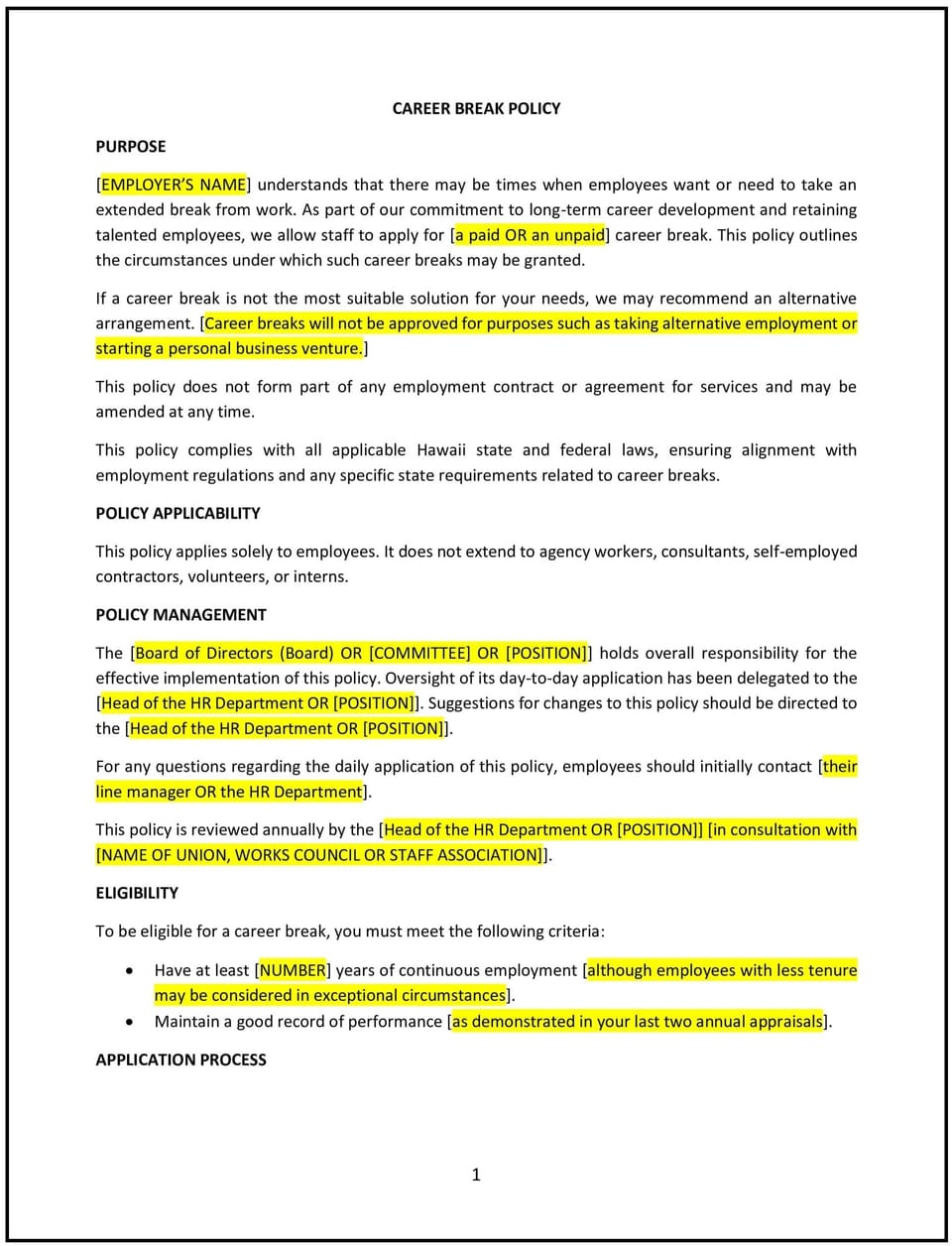Career break policy (Hawaiʻi): Free template

Career break policy (Hawaiʻi)
A career break policy helps Hawaiʻi businesses support employees who need extended time off for personal, educational, or family reasons. This policy outlines eligibility, duration, and procedures for requesting and returning from a career break. It is designed to promote work-life balance, retain valuable talent, and address Hawaiʻi-specific considerations, such as cultural values and local workforce dynamics.
By implementing this policy, businesses in Hawaiʻi can demonstrate flexibility, enhance employee loyalty, and create a supportive workplace culture.
How to use this career break policy (Hawaiʻi)
- Define eligibility: Specify which employees are eligible for a career break, such as full-time or long-term employees, and any minimum tenure requirements.
- Outline reasons for career breaks: Provide examples of acceptable reasons for a career break, such as personal development, education, caregiving, or travel.
- Establish duration: Define the maximum length of a career break, such as six months to one year, and whether extensions are possible.
- Set request procedures: Provide clear instructions for employees to request a career break, including required documentation and advance notice periods.
- Address benefits and pay: Specify whether employees will retain benefits, such as health insurance, during the break and whether the break is paid or unpaid.
- Plan for re-entry: Outline the process for employees to return to work, including reinstatement to their previous role or a similar position.
- Communicate the policy: Share the policy with employees during onboarding and through internal communications to ensure awareness and understanding.
- Review and update the policy: Regularly assess the policy’s effectiveness and make adjustments as needed to reflect changes in employee needs or workplace dynamics.
Benefits of using this career break policy (Hawaiʻi)
This policy offers several advantages for Hawaiʻi businesses:
- Retains valuable talent: Offering career breaks can help businesses retain experienced employees who might otherwise leave the workforce.
- Promotes work-life balance: Employees can address personal or family needs without sacrificing their careers, improving overall well-being.
- Enhances employee loyalty: A supportive policy demonstrates the business’s commitment to employee growth and satisfaction, fostering loyalty.
- Attracts top talent: A career break policy can make the business more attractive to job seekers who value flexibility and work-life balance.
- Supports diversity and inclusion: By accommodating employees’ personal and cultural needs, the policy promotes a diverse and inclusive workplace.
- Boosts morale: Employees are more likely to feel valued and motivated when they know their personal needs are respected.
Tips for using this career break policy (Hawaiʻi)
- Communicate the policy effectively: Share the policy with employees during onboarding and through regular reminders, such as emails or employee handbooks.
- Be flexible: Consider individual circumstances when approving career breaks and allow for extensions if needed.
- Train managers: Educate supervisors on the policy’s guidelines and the importance of supporting employees during their break and re-entry.
- Plan for coverage: Develop a plan to manage workloads and responsibilities during an employee’s absence to minimize disruptions.
- Support re-entry: Provide resources or training to help employees transition back to work smoothly after their break.
- Review the policy periodically: Update the policy as needed to reflect changes in employee needs, workplace dynamics, or cultural considerations.
Q: Why should Hawaiʻi businesses adopt a career break policy?
A: Businesses should adopt this policy to retain valuable talent, promote work-life balance, and demonstrate a commitment to employee well-being.
Q: Who is eligible for a career break?
A: Eligibility should be clearly defined in the policy, typically including full-time or long-term employees with a minimum tenure requirement.
Q: What reasons are acceptable for a career break?
A: Acceptable reasons may include personal development, education, caregiving, or travel. The policy should provide clear examples.
Q: How long can a career break last?
A: The policy should specify the maximum duration, such as six months to one year, and whether extensions are possible.
Q: Should businesses provide benefits during a career break?
A: Businesses should decide whether to retain benefits, such as health insurance, during the break and outline this in the policy.
Q: How should businesses handle re-entry after a career break?
A: The policy should outline the re-entry process, including reinstatement to the employee’s previous role or a similar position.
Q: How often should the policy be reviewed?
A: The policy should be reviewed annually or as needed to reflect changes in employee needs, workplace dynamics, or cultural considerations.
This article contains general legal information and does not contain legal advice. Cobrief is not a law firm or a substitute for an attorney or law firm. The law is complex and changes often. For legal advice, please ask a lawyer.


